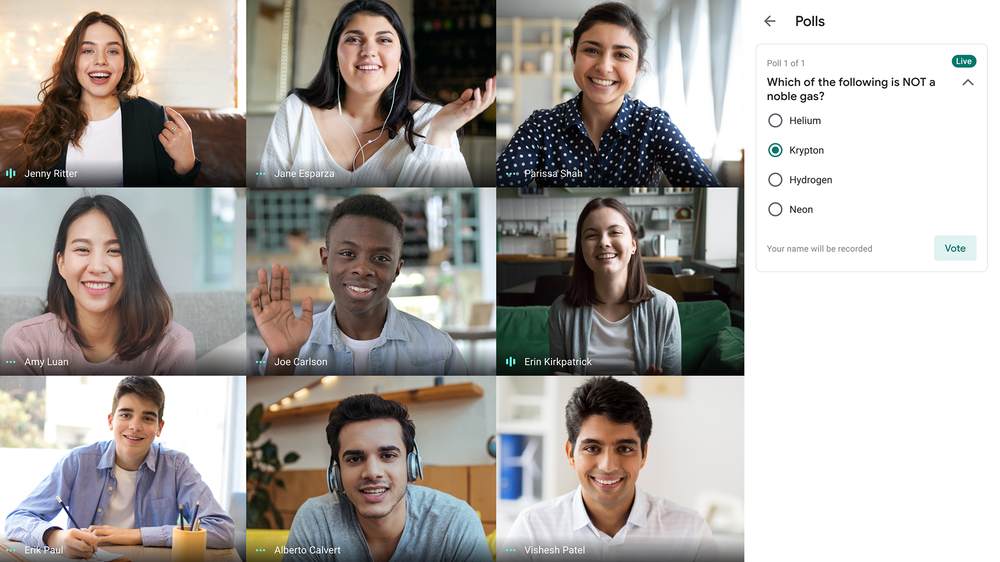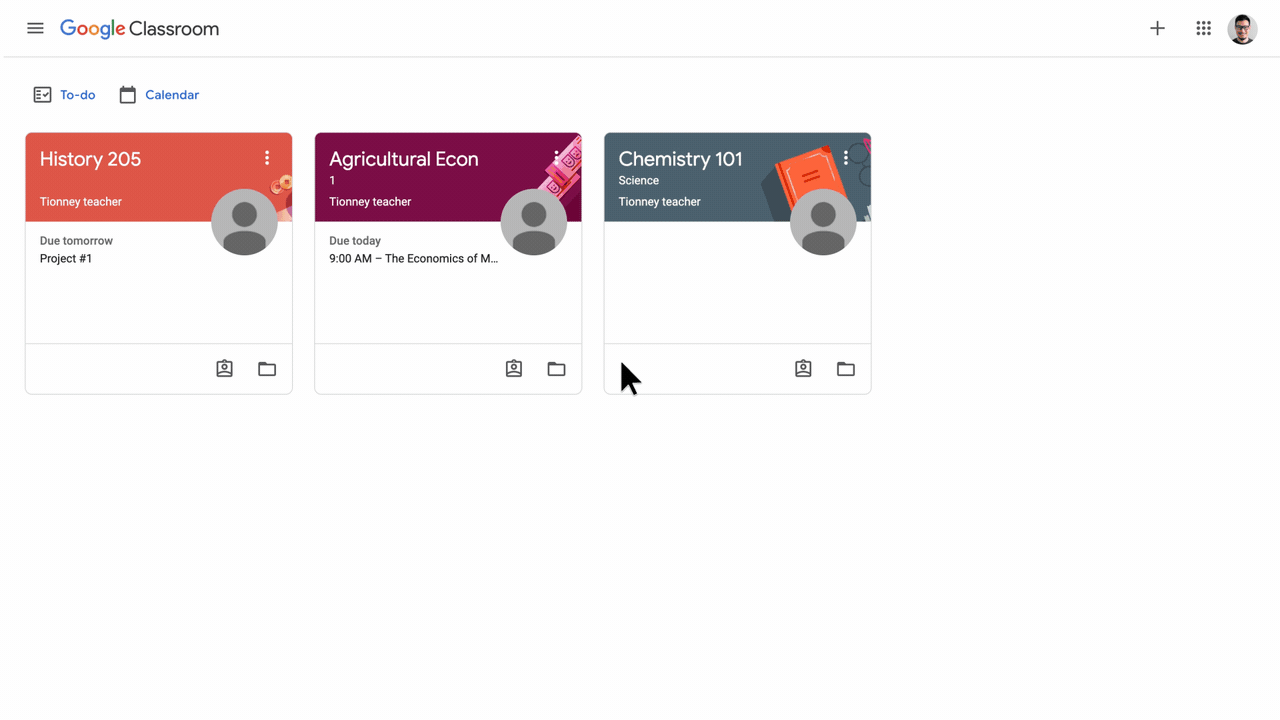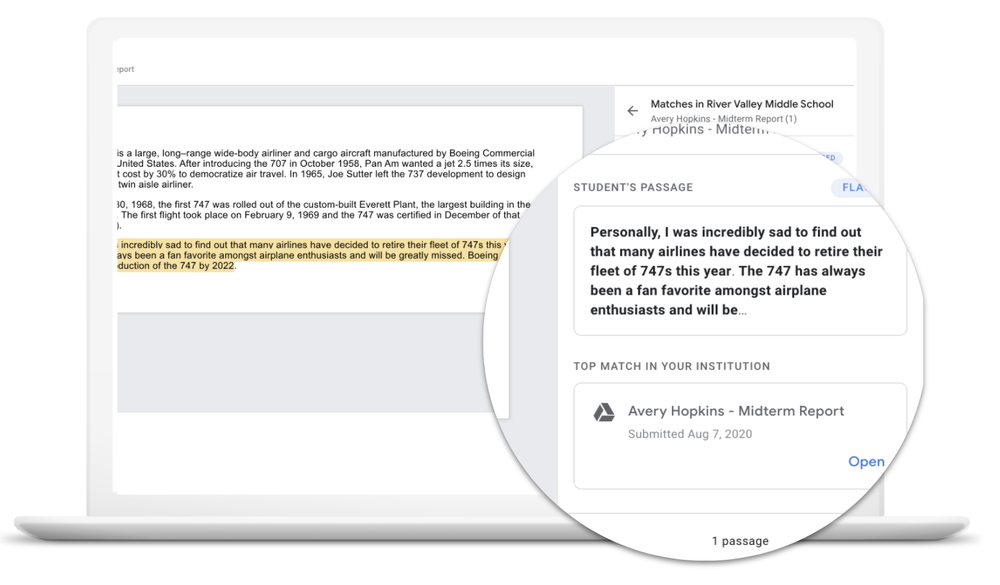More details on what's coming to Meet and Classroom
Editor’s note: On August 11, 2020 Google for Education kicked off a global back-to-school event, The Anywhere School. Check out the full recap of product launches and our collection of announcements.
Google has always aimed to invest in products, programs and philanthropy that make learning possible for everyone, anywhere. This year we’ve been especially inspired by the teachers and students around the world who have used our tools in new creative ways and at unprecedented scale.
As schools start this next semester, we’re excited to share the many new capabilities we’re bringing to Meet and Classroom, to support teaching and learning, no matter where it’s taking place. Let’s start with what’s coming to Meet.
Control for moderators
Over the next few months, we’re giving moderators of Education meetings more controls for managing their virtual classes. Here are new capabilities, arriving in September, that moderators will have:
- Prohibit participants from joining meetings after they’ve been ejected or after they’ve been denied entry twice (launching later this month)
- End meetings for all participants when class is finished
- Manage join requests with ease by accepting or rejecting them in bulk
- Disable in-meeting chat and set restrictions on who can present during a meeting
- A setting that requires the teacher to join first
Interactivity in Meet
Opportunities for interactivity are critical for distance learning and we’re sharing new features to increase engagement with your students virtually:
Launching in September
-
A larger tiled views with a 7x7 grid so you can see up to 49 students at once
-
A collaborative whiteboard with Jamboard in Meet so you can encourage students to share ideas and try creative approaches to lessons
Launching in October
-
Blur or replace backgrounds so everyone feels more comfortable during distance-learning classes. Note: Admins can disable custom backgrounds as needed.
-
Attendance tracking to see and track which students attended virtual class (G Suite Enterprise for Education)
-
Breakout rooms so educators can split classes into simultaneous small group discussions (G Suite Enterprise for Education)
Launching later this year
-
Hand-raising to help you identify students who may need help or have a question
-
Q&A features to provide a way for students to ask questions without disrupting the flow of the class discussion or lesson, and polling to engage students to share their voice (G Suite Enterprise for Education)

New features coming to Meet can help make classes more engaging.
Additionally, we’ll launch temporary recordings later this year, which will be available to all Education customers for free (premium recordings will still be part of G Suite Enterprise for Education). With this new feature, any meeting host can record a meeting and share the recording within their domain for up to 30 days before the video expires. Given disparities in internet access, temporary recordings are intended to help students or meeting participants replay a class or session they couldn't attend live. Temporary recordings cannot be shared outside the host’s domain or downloaded. We’re granting continued free access to premium recordings until temporary recordings are available later this year (note: this is replacing the promotion for access to premium Meet features including live streaming and meetings of up to 250 participants that will be ending on September 30th).
Now, let’s cover new features you can expect in Classroom.
Helping students and instructors stay on top of their upcoming work
Both students and instructors have risen to the challenge of learning and teaching from home, but it can be tough to stay on top of what they need to do and when. To help instructors and students better discover and track their work in Classroom, the Classes page will soon have a to-do widget for students and a to-review widget for teachers.

New, easier ways to join classes
In addition to sharing course join codes, educators can now share a link to join classes with a single click. Link-sharing allows educators to share classes anywhere they communicate with students, including in messaging platforms such as WhatsApp.

Spot missed citations with enhanced originality reports
Originality reports, which are built into Classroom and Assignments, provide educators with flags for potential plagiarism in student work and also help students quickly identify passages that may need citations. Now, we’re making originality reports even more helpful.
First, we’re raising the number of originality reports that educators can use per class from three to five. (Educators with G Suite Enterprise for Education licenses will continue to get unlimited originality reports.) Educators will also be able to print, save and download reports to share with students, parents and administrators. Soon educators and students will be able to run originality reports on Google Slides, in addition to Google Docs, as well as in multiple languages, including Spanish, Portuguese, Norwegian, Swedish, Indonesian and Italian.
Check for potential plagiarism between students
Traditionally, originality reports have surfaced matches for potential plagiarism against hundreds of billions of web pages and over 40 million books. Now, instructors with G Suite Enterprise for Education licenses will be able to see potential plagiarism between students at their school. Starting in a few weeks, originality reports will check submissions against a private, school-owned repository of past student work to look for student-to-student matches. Student submissions are automatically added when instructors use originality reports in Classroom. If admins want to actively manage the repository, they can manually add files or remove documents directly. Google never has access to or the ability to use this repository—it’s owned and used solely by the school domain.

More visibility and tools for Classroom admins
Coming soon, we’re rolling out additional tools for adminswho want to troubleshoot Classroom issues or gain deeper insights into usage across their domain. For example, all Education admins will now have access to Classroom audit logs, and admins with an Enterprise license will also be able to export their logs to BigQuery or create a customizable dashboard on Data Studio to see a slate of engagement metrics.Classroom now available in additional languages
With Classroom usage quickly growing around the world, we’re making it accessible to more learners in their native language. We’ll be launching Classroom in 10 additional Indian languages. Soon Classroom will support over 54 languages globally; with even more coming in the future.
More support from partners
With the new features in Google Classroom, you’ll also see that many apps are also launching new features that make their tools easy to use alongside Classroom. Explore these apps to learn how teachers and students can continue to stay organized, interactive, and collaborative with Classroom: Canva, Nearpod, Screencastify, Achieve3000 and Adobe, to name a few.Classroom features coming soon
In the coming month, we will provide a more detailed roadmap to help education leaders and teachers understand and prepare for other improvements that will launch to Classroom throughout the school year. Here’s a sneak peek at some of the specific areas we’ll be working on:
-
Student engagement metrics: Educators will be able to see stats that help track how students are interacting in Google Classroom each day.
-
Deeper integration with other teaching tools. With Classroom now playing a role as “mission control” for many classes, we'll enable more seamless integrations with the content and learning tools schools are using alongside Google’s tools.
-
Mobile offline improvements. We know that home and mobile internet connections aren’t always available or reliable, so we’re working to update the Classroom mobile apps to work much better even with intermittent connectivity.
If we can’t all physically be together in our schools this year, we’re committed to making Classroom and Meet even better to bring everyone together online. Please continue to share your feedback, and we’ll keep adapting our tools to meet your evolving needs.
by Zach YeskelGoogle for Education via The Keyword
Comments
Post a Comment